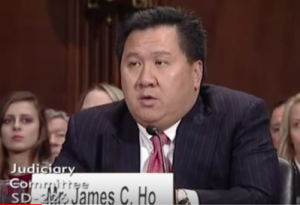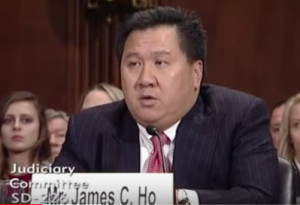
(via YouTube)
In the latest partisan stunt from two-time law school boycotter Judge James Ho, he and 12 conservative colleagues sent a letter to the president of Columbia University earlier this week, stating these jurists will no longer hire Columbia Law School — or even Columbia University — graduates as law clerks due to the ongoing campus protests and the university’s alleged failure to properly respond.
These antics are a distraction from some genuine issues — properly addressing antisemitism on campus, as well as the line between protest and disruption.
It’s not the first time Ho has used his position to voice his objections to campus practices. Yet it’s been pointed out that these 13 judges are abusing their positions of power to bully a private institution they disagree with. This misuse of power contradicts the judiciary’s role as a neutral arbiter of disputes and undermines public confidence in the judiciary.
Notably, there was an absence of similar judicial outcry when, for example, Congress held three hearings (in 2018, 2020, and 2022) about the lack of workplace protections for their law clerks and other judiciary employees; legislation was introduced to correct this injustice that would benefit from public judiciary support; news coverage revealed widespread ethics issues in the federal judiciary, including harassment and bullying; and a Second Circuit colleague was reprimanded for an overly harsh work environment. All of these were met with judiciary silence, which speaks volumes about the judiciary’s historic unwillingness to call out workplace issues within their ranks.
The undertone of this letter is ideological: these judges are publicly expressing their reluctance to hire from what they perceive as a “progressive” institution. Many judges seek ideological matching in their clerks. As someone who clerked for a judge more progressive than myself, which created challenges, particularly in criminal cases, I am not unsympathetic to judges’ interest in ideological alignment.
This manufactured controversy is just another example of the lack of transparency and equity in clerkship hiring. While most federal judges do not resort to attention-seeking tactics, many do prioritize or deprioritize certain law schools — and other characteristics — in their hiring decisions. This lack of transparency not only perpetuates inequity, but also undermines the integrity of the judiciary.
In no other legal work environment — not a law firm, not a government employer — could employers get away with the type of otherwise discriminatory hiring practices that judges engage in (if the judiciary were subject to Title VII of the Civil Rights Act, of course). Applicants for most legal jobs can access demographic hiring data, and most workplaces boast about their diverse hiring and inclusive workplace culture.
Yet many applicants seeking prestigious federal judicial clerkships are actually auditioning to be someone their judge would like to have a beer with. That doesn’t work in presidential politics, and it doesn’t work in clerkship hiring, either.
Many federal judges hire predominantly from the Top 14 (“T14”) law schools, with a preference for the Top 5 (“T5”). Perhaps judges simply wanted the smartest, best applicants for their rigorous law clerk work, and these applicants are overrepresented at top law schools.
Beyond that, many judges appear to prioritize their alma maters, or schools from which they routinely hire. I often hear about judges who “always” hire at least one law clerk per year from a particular school, explicitly prefer hiring from a specific school, or even give the clerk from that priority school “special responsibilities.”
Clerks and judges have also told me, on more than one occasion, that after a judge made a “bad hire” and a clerk did not work out, the judge said they’d “never” hire clerks from that law school again. It is as if one clerk’s mistake (probably not the catastrophe the judge made it out to be), represents all clerks who graduated from that school.
But this is a much bigger problem than just a few elitist judges hiring from their favorite schools. Clerkship hiring is unregulated, inequitable, and glaringly unresponsive to an otherwise diverse legal workforce.
What Are The Demographics Of Federal Law Clerks?
We do not know, since, unlike other workplaces, the federal judiciary is not required to release any data on hiring. The judiciary’s resistance to transparency creates a lack of accountability for this unnecessarily insular workplace.
The National Association for Law Placement (NALP) collects and releases data every few years for law clerks who clerk straight out of law school (recognizing that many clerks work for several years before clerking). According to NALP’s 2019 data, 79% of federal and 72% of state clerks were white. Law clerks are also predominantly male. And despite the increasing representation of nonwhite students on law school campuses, they remain underrepresented among law clerks.
Nor is there much transparency about what judges look for in clerks, or when they hire them, despite clerkship applicants’ overwhelming desire for this type of information. I’ve bemoaned the emphasis — on “fit” — that is, judges asserting that they look for clerks who will fit in well in chambers, or who they’d enjoy working closely with for a year or two.
Who is a “good fit” with a middle-aged or older white male judge? Probably a white male clerk. And if the judge is willing to take a “risk” and hire outside the standard mold, the applicant will probably be someone who does not rock the boat in chambers.
That disadvantages whole generations of assertive, outspoken young lawyers. But in our clerkship-obsessed, prestige-focused legal profession, where a clerkship is messaged as the ultimate gold star or necessary check box for many legal jobs, clerks who do not fit this mold are pressured to either conceal their personalities, or they are boxed out of these opportunities, which are often launchpads to career success.
And When Do Judges Hire Clerks?
Unsurprisingly, it also varies. There have been few systematic attempts to compile data, let alone make it readily available to applicants. The Online System for Clerkship Application and Review (OSCAR) has implemented several iterations of the Federal Law Clerk Hiring Plan. The plan intended to ensure judges did not interview and hire clerks before the summer of their 2L year (when they had four semesters of grades). It was an attempt to level the playing field for more applicants and correct the insane practice of judges hiring 1Ls (because getting an A in first-year Constitutional Law is probably not the best indicator of a 25-year-old’s ability to thrive in a federal judicial chambers).
However, like all initiatives in the federal judiciary, the plan is “optional.” Only several circuits have opted in. Even judges who ostensibly follow it may get around it by hiring clerks several years ahead (requiring them to backfill several years of post-graduate work before beginning their clerkships in, say, 2026).
The Administrative Office of the U.S. Courts (AO) should survey judges, asking them to provide a list of, let’s say, the past 10 years’ worth of law clerk hires — their names, genders, races, and law school affiliations. Judges proudly boast about their law clerk “families” and almost certainly have this information. The U.S. Courts also collect some information during the law clerk onboarding process, although it’s unclear whether they preserve it.
This year, the Government Accountability Office will release a report about the federal judiciary’s workplace climate. The AO is still deciding which aspects of its long-awaited workplace climate assessment it will release publicly.
This summer — as another class of aspiring federal law clerks interviews for and accepts clerkships — would be the perfect time for Congress, the media, and the public to demand that the judiciary also collect and release this demographic data about law clerk hiring.
Law schools also maintain information about clerkship hiring. They could provide this to a nonpartisan entity for review and analysis.
Understanding the scope of these problems is the first step toward crafting effective solutions. Maybe the judiciary should get its own house in order, rather than intervening in the affairs of private law school campuses.
What Is The Solution To This Broken Law Clerk Hiring System?
Sunlight is the best disinfectant. If the judiciary released — and the media reported on — law clerk demographic data, prospective clerks would gain a better understanding of which judges hire diverse clerks. This could help redistribute clerkship applications accordingly.
There should also be more oversight — from chief judges, the AO, and even Congress — over judges’ hiring of clerks. “Separation of powers” does not mean “judges are above the law.”
It’s also time to revise the OSCAR Law Clerk Hiring Plan to ensure more judges and circuits comply. Treating each judge’s chambers as its own little “fiefdom,” and each judge as HR coordinator and DEI director, creates inequitable and unsafe work environments.
How can we incentivize judges to comply with the plan? Should they be punished for not complying? Or should we scrap the plan entirely in favor of a more standardized federal law clerk hiring system? These are the questions we should be asking.
Some law schools try to emphasize on-plan hiring by not adequately advising 1Ls. But this just disadvantages students applying off-plan (primarily to conservative judges).
We are heading into another clerkship application cycle where many judges will privately “boycott” certain schools and prioritize others, or privately “boycott” certain demographic groups. Just because these problematic hiring practices do not routinely make the news, does not mean they should not be called out and corrected.
Instead of sending another attention-seeking letter to their latest T5 law school opponent, some judges might instead use their power and influence to write a letter to the AO, encouraging them to collect and release data on law clerk hiring. Or they should look inward and reconsider their inequitable hiring practices.
This “boycott” of Columbia clerks is really just judges telling on themselves. It’s a public statement about what judges have been doing privately all along.
 Aliza Shatzman is the President and Founder of The Legal Accountability Project, a nonprofit aimed at ensuring that law clerks have positive clerkship experiences, while extending support and resources to those who do not. She regularly writes and speaks about judicial accountability and clerkships. Reach out to her via email at Aliza.Shatzman@legalaccountabilityproject.org and follow her on Twitter @AlizaShatzman.
Aliza Shatzman is the President and Founder of The Legal Accountability Project, a nonprofit aimed at ensuring that law clerks have positive clerkship experiences, while extending support and resources to those who do not. She regularly writes and speaks about judicial accountability and clerkships. Reach out to her via email at Aliza.Shatzman@legalaccountabilityproject.org and follow her on Twitter @AlizaShatzman.


